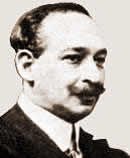José Ingenieros
José Ingenieros (April 24, 1877 – October 31, 1925) was an influential Argentine philosopher, psychiatrist, educator, and writer. Born Giuseppe Ingegnieri in Palermo, Italy, he moved to Argentina with his family at a young age. Ingenieros is best known for his contributions to Latin American philosophy and for his works on psychology, social and political analysis. His ideas played a significant role in shaping the intellectual and political landscape of early 20th-century Latin America.
Biography[edit | edit source]
José Ingenieros graduated from the University of Buenos Aires with a degree in medicine in 1900, where he later became a professor and was deeply involved in academic and student reform movements. His interest in psychology led him to establish the first laboratory of experimental psychology in Argentina in 1902. Ingenieros was a prolific writer, and his works covered a wide range of topics including philosophy, psychology, ethics, sociology, and politics.
Philosophical Work[edit | edit source]
Ingenieros' philosophical work was primarily focused on the critique of positivism and the development of a personalist and idealist perspective. He argued for the importance of ideals, values, and will in shaping human life and society. His most famous work, El Hombre Mediocre (The Mediocre Man), published in 1913, criticizes the lack of authentic individuality and the prevalence of mediocrity in society. Ingenieros posited that true greatness comes from striving beyond the average, encouraging a life of passion, creativity, and idealism.
Political Involvement[edit | edit source]
Ingenieros was also actively involved in the political and social issues of his time. He was a strong advocate for educational reform, social justice, and the improvement of the conditions of the working class. His political views were influenced by anarchism, socialism, and later, by a form of idealist nationalism. Despite his involvement in political activism, Ingenieros never affiliated himself with any political party, preferring to influence society through his writings and academic work.
Legacy[edit | edit source]
José Ingenieros left a lasting impact on Argentine and Latin American thought. His works continue to be studied for their insightful analysis of social, political, and psychological issues. The University of Buenos Aires established the José Ingenieros Award in his honor, recognizing outstanding contributions in the fields of social sciences and humanities.
Selected Works[edit | edit source]
- El Hombre Mediocre (1913)
- Principios de Psicología (1902)
- La Simulación en la Lucha por la Vida (1903)
- Las Fuerzas Morales (1910)
See Also[edit | edit source]
Search WikiMD
Ad.Tired of being Overweight? Try W8MD's physician weight loss program.
Semaglutide (Ozempic / Wegovy and Tirzepatide (Mounjaro / Zepbound) available.
Advertise on WikiMD
|
WikiMD's Wellness Encyclopedia |
| Let Food Be Thy Medicine Medicine Thy Food - Hippocrates |
Translate this page: - East Asian
中文,
日本,
한국어,
South Asian
हिन्दी,
தமிழ்,
తెలుగు,
Urdu,
ಕನ್ನಡ,
Southeast Asian
Indonesian,
Vietnamese,
Thai,
မြန်မာဘာသာ,
বাংলা
European
español,
Deutsch,
français,
Greek,
português do Brasil,
polski,
română,
русский,
Nederlands,
norsk,
svenska,
suomi,
Italian
Middle Eastern & African
عربى,
Turkish,
Persian,
Hebrew,
Afrikaans,
isiZulu,
Kiswahili,
Other
Bulgarian,
Hungarian,
Czech,
Swedish,
മലയാളം,
मराठी,
ਪੰਜਾਬੀ,
ગુજરાતી,
Portuguese,
Ukrainian
Medical Disclaimer: WikiMD is not a substitute for professional medical advice. The information on WikiMD is provided as an information resource only, may be incorrect, outdated or misleading, and is not to be used or relied on for any diagnostic or treatment purposes. Please consult your health care provider before making any healthcare decisions or for guidance about a specific medical condition. WikiMD expressly disclaims responsibility, and shall have no liability, for any damages, loss, injury, or liability whatsoever suffered as a result of your reliance on the information contained in this site. By visiting this site you agree to the foregoing terms and conditions, which may from time to time be changed or supplemented by WikiMD. If you do not agree to the foregoing terms and conditions, you should not enter or use this site. See full disclaimer.
Credits:Most images are courtesy of Wikimedia commons, and templates Wikipedia, licensed under CC BY SA or similar.
Contributors: Prab R. Tumpati, MD

